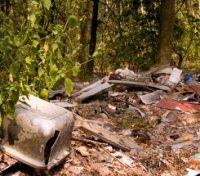

Waste crime has been described as the "new narcotics", according to Sir James Bevan, head of the Environment Agency.
Illegal waste activity costs England £1 billion a year, and more than 1,000 illegal waste sites were discovered in 2015, more than the previous two years combined. Of these, 662 were still active as of the end of March.
The offences sometimes involve organised crime gangs, and range from the illegal dumping of household and industrial waste, to massive frauds involving recycling fees and landfill tax. However action by the Agency led to almost 1,000 sites being shut down last year, with fines and prosecutions doubling.
"Waste is the new narcotics", said Bevan. "It feels to me like drugs felt in the 1980s: the system hasn't quite woken up to the enormity of what was going on and was racing to catch up."
Bevan told the Guardian that waste crime can have serious impacts on communities: "When you have an illegal waste site, it will look horrible, it will smell, be noisy and there are constantly fires.
"With drugs it took a while for the system to catch up and realise the damage drugs were doing. We are clear now about the damage waste crime does to communities and to the economy. The strategy is to work with the good guys and really nail the bad guys. We are both finding more illegal sites and nailing more. As the statistics show we haven't cracked it yet and it will be a long grind, but we are making progress."
He went on to say: "It attracts criminals because you can make a lot of money. The business model is very simple: you lease or find a bit of land, you then go and offer to remove skip loads of waste for a customer, which you dump on the land. All your money is made up front, in cash, and then you disappear."
There are some positive factors, however, and Bevan stressed the need to work with responsible, law-abiding waste companies who wanted to improve their operations. He also stated that overall England is dealing much better with waste than in the past, with half the amount of rubbish being sent to landfill than in 2000, and household recycling reaching a new high in 2015 of 45%.
"England is getting a better place to live - greener, cleaner and more prosperous. It is in part an example of regulation working. I have seen an example of what happens if you don’t regulate - the Bhopal disaster. If you think regulation is bad, try not doing it."